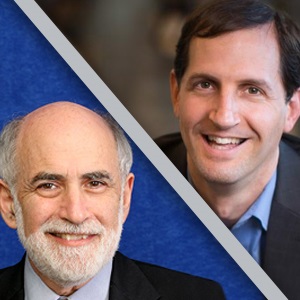Negotiation for Professionals

With more than 70 years of combined negotiation experience, Northwestern Pritzker School of Law Professor Leonard Riskin and Professor Daniel L. Shapiro of the Harvard Negotiation Program know a thing or two about negotiating in tough situations.
Riskin, a pioneer in introducing alternative dispute resolution and mindfulness into law schools, courts, and law practice, has published numerous books on dispute resolution—including Dispute Resolution and Lawyers (Westgroup, 5th ed. 2015)(co-authored) and written essays for both academic journals and national news outlets ranging from the California Law Review to The Atlantic Monthly. Shapiro, who is globally-sought for his conflict resolution skills, has brokered successful negotiations in the Middle East, Europe, and Asia, most recently assisting in the complex facilitation of Brexit after the British election. His most recent book, “Negotiating the Nonnegotiable: How to Resolve Your Most Emotionally Charged Conflicts,” offers practical conflict resolution strategies in the wake of a polarizing political climate in the U.S. and abroad.
Both Riskin and Shapiro are active in the field, constantly negotiating, advising, or training in professional settings.
“What we teach is based on research and empirical evidence,” said Shapiro. “Len and I are not just armchair academics, we’re out there in the real world advising in negotiations all the time.”
Together, the duo developed the course Negotiation for Professionals, which they’ve co-taught every summer at Northwestern University School of Professional Studies for more than a decade. In the class, they work with a wide range of business executives, lawyers, psychologists, and other professions using a distinct system of negotiation strategies that lead to more amicable and mutually beneficial solutions. Riskin explained:
“Students go back to their organizations knowing a lot more about different ways to negotiate. If people pay attention only to their own demands and interests, they miss a lot of opportunities for better agreements and more pleasant interactions.”
Shapiro added, “In our course, one of the things we emphasize is thinking about how you can break through a tribal mentality. How do you listen most effectively when you feel under attack? It’s as important to think about this in the business realm as it is in the community or political realm.”
One unique facet of the course is training in mindfulness and internal family systems. In many negotiations, Riskin and Shapiro note, those involved are too busy focusing on their next move or default to a combative approach, but neglect to pay attention to the interests of other parties at the table, which in turn can reduce negotiations into a win-lose situation.
“Our worst enemy often isn’t the other side, it’s ourselves,” said Shapiro. “We put ourselves in traps due to our own habits and lack of attention to details going on during a negotiation.”
Riskin expanded, “Let’s say you’re in a negotiation and something goes wrong, something difficult happens or someone explodes and you get upset. If you can’t think straight, you will not negotiate wisely. We teach ways to become mindful so that you can respond skillfully in that moment, rather than losing your cool.”
Both professors have been impressed by the caliber of the students enrolled in their class year after year. The course is fast-paced, covers lots of ground, and the instructors take pride in their at times unorthodox teaching methods, borrowing exercises from awareness meditation and improvisational comedy. With that said, they have high expectations of those who sign up for the course.
“We hear stories year after year about people who have taken the course and go back to their organizations and are much more effective at negotiating,” Shapiro concluded. “They get better deals, they build better relationships, and they’re more effective at influencing.”
